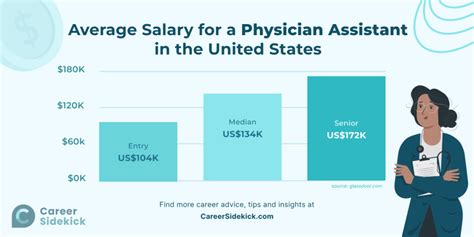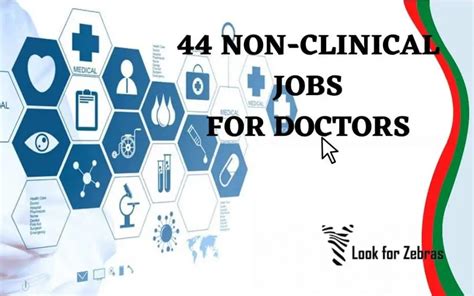Intro
Explore 10 non-clinical careers for physician assistants that leverage their medical expertise and skills. From healthcare consulting to medical writing, discover alternative career paths that offer flexibility and growth opportunities. Learn how PAs can transition into roles like health education, research, and medical sales, and find fulfillment beyond traditional clinical settings.
The role of Physician Assistants (PAs) has been evolving over the years, and their expertise is no longer limited to clinical settings. With their unique blend of medical knowledge and versatile skill set, PAs can excel in various non-clinical careers that leverage their strengths. If you're a PA looking to transition into a non-clinical role or simply exploring alternative career paths, this article is for you.
Physician Assistants possess a distinct combination of skills that make them highly valuable in non-clinical settings. Their medical expertise, strong communication skills, and ability to work effectively in teams make them an attractive asset to various industries. As the healthcare landscape continues to shift, PAs are finding new opportunities to apply their skills in innovative and rewarding ways.

What Non-Clinical Careers Are Available to Physician Assistants?
While many PAs choose to remain in clinical practice, others are drawn to non-clinical careers that offer new challenges and opportunities for growth. Here are 10 non-clinical careers for Physician Assistants:
1. Medical Writing
PAs can leverage their medical expertise to create engaging content for healthcare organizations, medical device companies, or pharmaceutical firms. Medical writing involves crafting articles, blog posts, and educational materials that communicate complex medical information to various audiences.
2. Health Education and Promotion
Physician Assistants can work in health education and promotion, developing programs and materials that promote healthy behaviors and disease prevention. This role involves collaborating with community organizations, schools, and healthcare providers to design and implement effective health education initiatives.
3. Medical Sales and Marketing
PAs can transition into medical sales and marketing roles, where they work with pharmaceutical companies, medical device manufacturers, or healthcare technology firms. In this role, they use their medical knowledge to promote products, develop marketing campaigns, and build relationships with healthcare professionals.

4. Health Policy and Advocacy
Physician Assistants can influence healthcare policy and advocacy efforts, working with government agencies, non-profit organizations, or private companies. In this role, they analyze healthcare data, develop policy briefs, and advocate for changes that improve patient care and access to healthcare.
5. Medical Research and Development
PAs can contribute to medical research and development, working in academic institutions, research centers, or private companies. In this role, they design and conduct studies, analyze data, and develop new medical products or technologies.
6. Healthcare Consulting
Physician Assistants can work as healthcare consultants, providing expertise to healthcare organizations, medical groups, or private companies. In this role, they analyze healthcare systems, identify areas for improvement, and develop strategies to optimize operations and patient care.

7. Medical Informatics and Technology
PAs can apply their medical expertise to the development and implementation of healthcare technology, working in medical informatics, data analysis, or health IT. In this role, they design and optimize electronic health records, analyze healthcare data, and develop innovative solutions to improve patient care.
8. Public Health and Epidemiology
Physician Assistants can work in public health and epidemiology, analyzing data, developing programs, and implementing initiatives that promote population health and disease prevention.
9. Medical Publishing and Editing
PAs can transition into medical publishing and editing roles, working with medical journals, books, or online resources. In this role, they review manuscripts, edit content, and ensure the accuracy and quality of medical information.
10. Academic and Educational Roles
Physician Assistants can pursue academic and educational roles, teaching and mentoring students in PA programs, medical schools, or other healthcare education settings. In this role, they develop curricula, teach courses, and mentor students in their academic and professional development.

Why Non-Clinical Careers for Physician Assistants?
Non-clinical careers offer Physician Assistants a range of benefits, including:
- Diversified skill sets: Non-clinical careers allow PAs to develop new skills and expertise, enhancing their professional versatility.
- Variety and challenge: Non-clinical roles offer new challenges and opportunities for growth, helping PAs stay engaged and motivated.
- Flexibility and work-life balance: Non-clinical careers often provide more predictable schedules and better work-life balance, allowing PAs to prioritize their personal and professional goals.
- Opportunities for advancement: Non-clinical roles can lead to leadership positions, entrepreneurial ventures, or other opportunities for advancement.

Conclusion
Physician Assistants possess a unique combination of skills that make them highly valuable in non-clinical settings. From medical writing and health education to healthcare consulting and medical research, non-clinical careers offer PAs a range of opportunities to apply their expertise and pursue new challenges. Whether you're looking to transition out of clinical practice or simply explore alternative career paths, consider the many non-clinical careers available to Physician Assistants.
We'd love to hear from you! Share your thoughts on non-clinical careers for Physician Assistants in the comments below. Have you transitioned into a non-clinical role or know someone who has? Share your experiences and insights with our community.
What are some common non-clinical careers for Physician Assistants?
+Some common non-clinical careers for Physician Assistants include medical writing, health education and promotion, medical sales and marketing, health policy and advocacy, and healthcare consulting.
What skills do Physician Assistants bring to non-clinical careers?
+Physician Assistants bring a unique combination of medical knowledge, strong communication skills, and ability to work effectively in teams to non-clinical careers.
Why do Physician Assistants choose non-clinical careers?
+Physician Assistants choose non-clinical careers for various reasons, including diversified skill sets, variety and challenge, flexibility and work-life balance, and opportunities for advancement.
